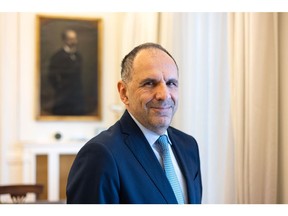Article content
(Bloomberg) — Negotiations to create a maritime corridor to transport essential goods to the Israel-Gaza region are making progress toward an agreement soon, according to Greek Foreign Minister Georgios Gerapetritis.
“We expect developments on this issue in the following days,” Gerapetritis said in an interview in Athens on Monday.
Article content
Greece, which is in talks with France and Cyprus among others, will “provide humanitarian aid primarily with its commercial fleet,” he said. If necessary, Greece is willing to send aid through military means, as it did in November when it sent a C-130 with pharmaceutical and medical supplies to Gaza through Egypt.
Article content
Several countries and international organizations have been seeking to boost supplies of humanitarian aid to Gaza by securing a sea path, as the Israel-Hamas war rages on, but an accord has failed to materialize.
US National Security Adviser Jake Sullivan discussed getting more humanitarian aid into Gaza with Palestinian Authority President Mahmoud Abbas in a visit to the West Bank on Friday.
“The sea corridor is an extremely difficult exercise because at the moment there is no safe port in the Gaza Strip for ships to dock,” Gerapetritis said.
Despite continuing regional tensions, Greece has warmed relations with its neighbor Turkey, with the two countries vowing to enhance bilateral cooperation three years after they almost reached the brink of war.
“We have learned to discuss our differences in a way that doesn’t produce tensions or create crises,” Gerapetritis said, a few days after Prime Minister Kyriakos Mitsotakis met President Recep Tayyip Erdogan, during the latter’s first visit to the Greek capital since 2017.
‘Live Harmoniously’
Greece and Turkey signed 15 agreements, joint declarations and memoranda in sectors including trade, tourism, energy and education. The agreements “must be implemented,” Gerapetritis said, adding that the two countries “must proceed with them as a practical proof that we can live harmoniously together.”
Article content
Long-running tensions between the two countries include the reunification of Cyprus, which was fully divided in 1974 after Turkey’s invasion. Turkey captured the northern third of the island and saying it intended to protect the minority Turkish Cypriots following an Athens-backed coup by supporters of union with Greece.
Greece and Cyprus back a United Nations position to reunify the island on the basis of a bi-zonal federation. Turkey favors a two-state solution.
As Greece returns to the path of growth, with the economy expanding at a faster pace compared to its international peers and investment grade returning, the government now plans to focus increasingly on foreign policy.
“I think that because of the good economic situation of the country, the international capital that we have at the moment is very strong and allows us many times to operate from a position of power, but mainly to operate with confidence,” Gerapetritis said.
The minister said his country’s efforts to ensure the return of the Parthenon Sculptures, removed from the ancient Greek temple of the Acropolis at the start of the 19th century, are continuing.
UK Prime Minister Rishi Sunak’s last-minute cancellation of a meeting with his Greek counterpart Kyriakos Mitsotakis in London last month brought renewed attention to the centuries-old dispute over the ownership of the sculptures, sometimes referred to as the Elgin Marbles.
“We have been in discussions with the British museum and the discussion is still ongoing,” Gerapetritis said. “Certainly, we are still not at the point where we can say that we are approaching the vision of the reunification of Parthenon Sculptures.”
—With assistance from Sotiris Nikas and Gina Turner.
Share this article in your social network

Comments